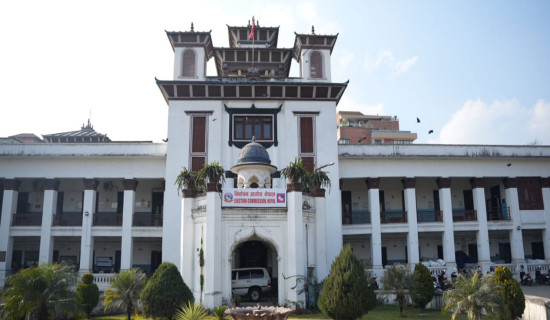- Sunday, 1 March 2026
Investing In Clean Air For Healthy Future
Our global environment is changing. Humanity’s dramatic impact on Earth’s biophysical and sociocultural conditions has enormous influences on the planet's life support systems. As we continue to face disrupted climate systems, extinction of life on Earth, pollution of air, water, and soil, pervasive changes in land use, and loss of biodiversity. As a result, human health and development gains are historically at risk.
Again, humanity’s footprint on Earth’s natural systems is becoming larger and more complex. Due to global population growth, the increasing trend of fossil fuel consumption, climate change, and deforestation, human health has been enormously affected over the decades. For instance, infectious diseases have intensely emerged in many low-income countries.
In this context, ecosystem approaches to health link public health and well-being with the environment and sustainable development. The approach is based on the understanding that health outcomes emerge from interrelationships within social–ecological systems. This approach largely relies on principles of interdisciplinary, participation, gender and social equity, systems thinking, and sustainability.
Due to climate change, uneven weather conditions, increased drought, and extreme storms, food insecurity is becoming more challenging in the globalised world. More importantly, evidence suggests that some crops are becoming less nutritious due to atmospheric changes. This increases people’s vulnerability to malnutrition and several other diseases, including mental health. Additionally, the global burden of diseases has profound impacts on the lives of socially marginalised populations across the world.
Therefore, in order to safeguard our health, promoting planetary health should be an important global priority for sustainable human development. This is a solutions-orientated, transdisciplinary field and social movement focused on analysing and addressing the impacts of human disruptions to natural systems on human health and all life on Earth.
In recent years, air pollution has been a serious threat not only to human health but also to planetary health. The recent statistics from the United Nations Environment Programme (UNEP) reveal an alarming situation of air pollution and its adverse consequences for humanity. According to UNEP, about 99 per cent of people worldwide breathe polluted air. Air pollution was responsible for 8.1 million deaths in 2021, with over 90 per cent associated with noncommunicable diseases, and more than 700,000 children under five deaths were from causes related to household and outdoor air pollution.
Indeed, the health consequences of air pollution are alarming. Evidence suggests that exposure to high levels of air pollution can cause differential health outcomes. According to the WHO, in 2019, air pollution caused about 6.7 million deaths. Of these, almost 85 per cent are attributable to non-communicable diseases (NCDs), including ischaemic heart disease, stroke, lung cancer, asthma, chronic obstructive pulmonary disease (COPD), and diabetes. This makes air pollution the second leading cause of NCDs globally after tobacco.
Major sources of air pollution include inefficient modes of transport, inefficient combustion of household fuels for cooking, lighting, and heating, coal-fired power plants, agriculture, and waste burning. Some air pollutants are also greenhouse gases having significant climate impacts. This further affects the burden of morbidity and mortality caused by air pollution.
In addition, air pollution has adverse effects on climate, biodiversity, and ecosystems, which are potentially large. Therefore, there is an urgent need for increased investment, stronger policies, and shared responsibility to combat air pollution and mitigate impacts on health, economies, and climate.
Unfortunately, there is limited knowledge and understanding about the growing issue of increasing air pollution and its adverse consequences on human and environmental health. More advocacy is needed to convince people and their communities that clean air is integral to a safe, healthy, and sustainable environment. Reducing air pollution is not only crucial for protecting our ecosystems, but also for achieving Sustainable Development Goals (SDGs).
Nepal’s recent 16th Plan has also prioritised climate change and air pollution as strategic interventions for actions. “Addressing climate change and air pollution in policies and strategic actions requires multi-sectoral responses. It is high time to localise community-led innovative interventions that have been operational in Kathmandu Valley,” says Hari Narayan Belbase, Programme Director at the National Planning Commission.
On the other side, national health policy and strategic priorities have highlighted issues of climate change and air pollution to safeguard human and environmental health. Similarly, existing efforts from the agriculture, forestry, and environment sectors are considering air pollution as a significant barrier to securing a safe environment. However, a coordinated approach is still lacking at the implementation level.
Expanding the knowledge base is vital for building political leadership and multi-sectoral coordination in order to address the air pollution with a more sustainable approach. Notably, with the support from partners such as USAID and a few others, there are some significant efforts to support governments in evidence-based policy making, enforcement, and implementation of strategic priorities on reducing air pollution and the Kathmandu Valley Air Quality Management Plan at the local level. This also includes municipality-led sustainable interventions to improve air quality and strengthen the resilience of local communities. Again, there are innovative efforts to place sensors that monitor air quality in Kathmandu.
“We have started to implement community awareness about air pollution and its adverse consequences on human health and the environment. Our plan to monitor air quality, build the capacity of health workers, civil society networks, and the communities is in progress. Moreover, climate change and air pollution are key priorities in our development agenda,” says Ghanshyam Giri, Mayor of Chandragiri municipality.
There are similar initiatives in Changunarayan Municipality. “Air pollution is a serious concern for our health and environment. We aim to further build political leadership, invest in clean air initiatives, and raise public awareness on air pollution and sustainable ways to mitigate the impacts of air pollution and health,” says Jeevan Khatri, Mayor of Changunarayan Municipality.
By committing to investing in clean air, we can help prevent far greater social, economic, environmental, and health-related expenses down the line. Moving forward, there are some emerging priorities in reducing air pollution by developing sustainable transport in cities, implementing solid waste management, and reducing industrial emissions.
In recent years, developing countries are progressively committing to a sustainability transition and adopting policies that will combat air pollution and climate change in a new era of renewable energy generation, electric mobility, and sustainable urban development. This transition will reshape societies and create opportunities for equitable and inclusive growth.
(Bhandari is a health policy analyst and has an interest in anthropology.)















